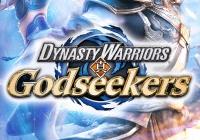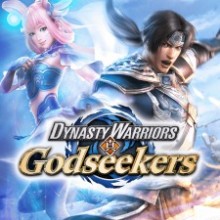Dynasty Warriors: Godseekers (PS Vita) Review
By Luna Eriksson  27.02.2017
27.02.2017

From a strategy action title to a strategy RPG. The jump is huge, as the genres play on very different aspects to satisfy their player bases. Some would even be cynical enough to say that it is impossible to translate the feeling of a Dynasty Warriors game into an SRPG. Dynasty Warriors: Godseekers aims towards this goal, and does somewhat succeed. Read on, as Cubed3 takes command of an army of legends!
Dynasty Warriors: Godseekers seeks to take the franchise into an entirely new genre, which has become somewhat of a great trend of late. It is enjoyable to see developers explore ways to translate their franchises into different genres while still maintaining their core. It is always difficult, but few franchises have created their own sub-franchise in the way Dynasty Warriors has, and this puts a lot more pressure on Godseekers to retain that series core.
On paper, it might seem easy to bring the Dynasty Warriors experience to a SRPG system, thanks to the heavy focus on positioning and real-time tactical choices, and this game does a good job of making itself feel like a title in the same series. It is a very solid SRPG, with some really interesting objectives.

The gameplay does wonderful work in using the common link between the franchise and SRPG titles as a focus: the importance of positioning. Everything in Dynasty Warriors: Godseekers truly shows this, from the interesting attack patterns to the ingenious synchro attack system, which rewards the player a lot for keeping characters within reach of one another in one massive army-killing attack.
Another thing it uses wonderfully is the lore of Romance of the Three Kingdoms to create a social net between the characters, which is something Fire Emblem has done everything in its power to enforce as a genre staple. This system is, thankfully, not used to romance people, but rather to unlock new missions and characters through connecting their fates to the protagonist.

While Dynasty Warriors: Godseekers has tried its best to keep the core of the franchise in this mixture with the SRPG genre, some compromises have been made that would have been important for the gameplay. The absolute biggest flaw that quickly might turn into a deal breaker for some is the huge number of enemies on the screen.
Dynasty Warriors is known for playing on the romantic feeling of strong warriors ploughing through armies of enemies to both make the player feel empowered, but also to put focus on how powerful and important these warriors are. This does, however, translate really poorly into an SRPG where every single enemy unit has to move during the enemy phase of the turn. It gets even worse if the player has an ally with a huge army on their side.

Thankfully, there is a skip function, but it is still often a problem, as even when using manual skipping it can still take a minute or so, and in an SRPG it can sometimes be really important to check on the enemy movement. It is also not uncommon for Dynasty Warriors: Godseekers to lag from time to time, thanks to the huge number of enemies on the screen. The biggest slap in the face with this feature, though, is that these units are as much cannon fodder, if not more, in this game as in any other Dynasty Warriors title, meaning that they could've been easily removed without affecting much at all.
Dynasty Warriors: Godseekers fundamentally does a wonderful job translating the Musou experience to a new genre. The developers should, however, have compromised the number of units on the battlefield more, as the long and boring enemy turns make the game feel sluggish and tedious really quickly. Sometimes it is straight out painful to play, thanks to how grindy and it is to fight off mountains of cannon fodder foes. When 80% of the enemy units could have not been there and no difference would have been seen, beside the game feeling cleaner and more enjoyable, it is obvious that something is not right.

Cubed3 Rating
Good
What could have been a great SRPG based on the Dynasty Warriors franchise falls flat, thanks to the decision to keep the density of units from normal Musou games in an SRPG where the player actually has to sit through the enemy's turn. Having plenty of enemies to slice through to feel empowered and strong works well in real-time, but in turn-based games it is more likely that the player will fall asleep than feel excited when fighting against armies of enemies.

![]() 6/10
6/10
![]() 0
(0 Votes)
0
(0 Votes)
 Out now
Out now  Out now
Out now  Out now
Out now  Out now
Out now Comments
Comments are currently disabled

 Sign In
Sign In Game Details
Game Details Subscribe to this topic
Subscribe to this topic Features
Features






 Top
Top

